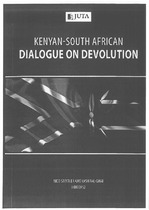| dc.description.abstract | The creation of provinces in 1994 gave effect to the grand compromise of the
1993 negotiations, but also raised fears about the deleterious consequences
they could hold for national cohesion. A first concern was that provinces
would work against national political cohesion, fanning the fires of separatism
and entrenching ethnic enclaves. In 1993 an apparent case in point
presented itself when the KwaZulu Legislature, dominated by Chief Mangosuthu
Buthelezi's Inkatha Freedom Party (IFP), adopted a draft constitution for
the then non-existent state of KwaZulu-Natal which would operate in a
confederal system for South Africa (Ellmann 1993). Similarly, the fear was that
a Western Cape governed by the National Party (NP) would perpetuate the
apartheid legacy. Both the IFP and NP, however, deemed themselves national
parties, and they, too, wanted to be part of the national scene where
resources and power were mainly located. | en_US |

